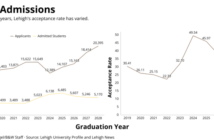Chester Toye, ‘17, originally came to Lehigh thinking he would major in engineering or business and graduate in four years. Now, he’ll be finishing his bachelor’s degree this spring in just three years with a major in something never done at Lehigh before — urban planning.
Toye started in the business school and eventually switched into the IDEAS program, but after a few semesters in the program he realized he still wanted more flexibility. He had been exposed to the concept of urban planning — the political and infrastructural techniques with which cities are built and developed — while studying abroad in Italy this past summer. After the discovery, he came to find that few colleges and universities offered a program so specific.
But he still wrote a note in his phone that read: “Create urban planning major.” It wasn’t until a few months later when talking to a friend about a seminar course in the subject that he recalled this reminder.
In an attempt to further customize his education and take classes he enjoyed, Toye posed the question if he could create his own major. And to his surprise, the answer was yes.
After discovering this was an option, Toye sought help from Cameron Wesson, associate dean for undergraduate programs in the College of Arts and Sciences, and Beth Pelton, academic coordinator for undergraduate studies, to help him with the customization process.
According to Wesson, students are permitted to form a committee that allows them to pick courses from different places to put them together to study something Lehigh does not offer a formal degree program in. The course selection is checked to make sure it includes the same kind of integrity and rigor that would be required for any other degree.
The option dates back to the ‘80s, Wesson said, and is sometimes overlooked by both students and faculty. In a little over a year, three students, including Toye, have completed a customized degree program.
“Not a lot of students know that they can cultivate their own degree,” Pelton said.
One student combined biology and computer science to complete their degrees faster in order to take a job offer that required the student to be available a semester earlier.
Wesson said the students that know this program exists are the ones that are taking more control over their education rather than passively completing the requirements for their major.
Lehigh is currently developing a program called “Lehigh in three” where students who know their intended field of study when they start at Lehigh, can map out their studies so that all core requirements are still met, but can be completed in six semesters.
“It’s basically hacking Lehigh,” Wesson said.
Pelton helped Toye get all of the necessary approvals to make his desired major a reality. She said passionate professors in the departments he was interested in made a huge difference in getting Toye’s program to work.
“I spent the next couple of weeks looking through all of the classes we had at Lehigh, putting together a program that made sense and classes that complimented each other nicely,” Toye said.
To combine the two disciplines he was interested in — architecture and political science — Toye found professor advisers in both departments and designed a curriculum of around 45 credits. The program had to be approved by his adviser in each department as well as the registrar.
Along with these advisers, he received guidance from Karen Pooley, an adjunct professor in the department of political science. She said she helped Toye define the heading under which his interests fell. Many of her classes integrate a variety of disciplines and focus on topics related to urban planning.
“Most things you benefit from getting to think about them from a couple of different perspectives,” Pooley said.
It was when Toye worked on planning out his program that he realized he could graduate a year early with his customized degree. He said a challenge with designing the entire program at once was that he had to plan his spring classes, too, which aren’t often finalized until later in the year.
After his program was approved, Toye posted to Facebook that he was creating his own major to help spread the word that this is possible at Lehigh. He said he has friends who are not happy with their programs and could potentially benefit from the interdepartmental studies option.
“A lot of people didn’t know it was an option, and they should know because you’re paying all of this money, you should know what your options are,” Toye said.
The option of interdepartmental studies still required that Toye complete all of the core requirements for the College of Arts and Sciences as well as complete 120 credits by the time he graduates. Toye plans to stay at Lehigh for a fourth year and complete a master’s of sociology, with plans to continue on to get a Ph.D.
“I kind of saw all of the pieces already here, it was just a matter of putting them together and not waiting two or three more years until I could do a graduate program,” Toye said.
He decided he didn’t want to wait to study what he was truly interested in. Toye said he enjoys his classes more now and likes the feeling that he is the one who has chosen to take them, instead of them being mandated by a curriculum Lehigh designed.
“When you create something, regardless of what it is, when you take ownership of it, it’s much more meaningful,” Toye said.





Comment policy
Comments posted to The Brown and White website are reviewed by a moderator before being approved. Incendiary speech or harassing language, including comments targeted at individuals, may be deemed unacceptable and not published. Spam and other soliciting will also be declined.
The Brown and White also reserves the right to not publish entirely anonymous comments.